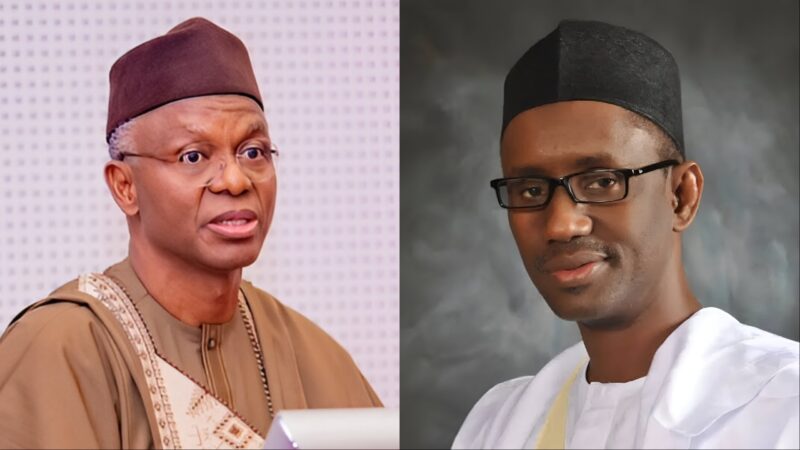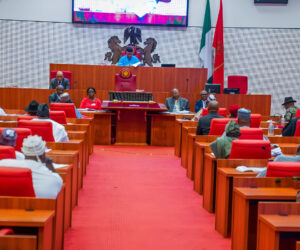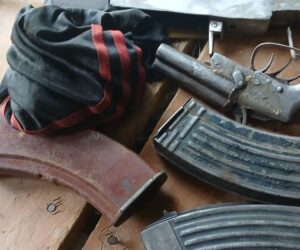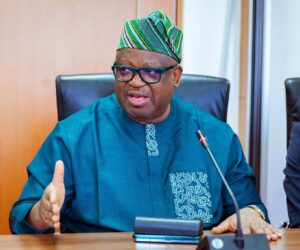Nigeria’s National Security Adviser (NSA) Nuhu Ribadu has strongly rejected allegations by former Kaduna State governor Nasir El-Rufai that the Federal Government is pampering bandits and offering them incentives.
Mr El-Rufai made the claim on Sunday night during an appearance on Channels Television’s Politics Today, alleging that the Office of the NSA (ONSA) coordinates a policy of payments to criminal groups.
The former alleged on the programme that the federal government was enabling bandits by paying, feeding and pampering them as part of the administration’s non-kinetic approach to addressing insecurity.
“What I will not do is to pay bandits, give them a monthly allowance, or send food to them in the name of non-kinetic,” Mr El-Rufai said when the achor, Seun Okinbaloye, asked him to compare his and the incumbent government’s approach to countering terrorism and banditry. “It’s nonsense; we’re empowering bandits.
“It’s not the government of Kaduna State; it’s a national policy driven by the Office of the National Security Adviser, and Kaduna is part of it. Kiss the bandits; that’s the new policy.”
But in a statement sent to PREMIUM TIMES early Monday, Mr Ribadu’s office described the allegation as “false, baseless, and deeply insulting to the sacrifices of Nigeria’s security forces.”
“At no time has the ONSA, or any arm of government under this administration, engaged in ransom payments or inducements to criminals,” the statement signed by Zakari Mijinyawa said.
“On the contrary, we have consistently warned Nigerians against paying ransom. El-Rufai’s allegations are not only false but also contradict verifiable facts on ground.”
The ONSA said the government adopted from the outset a dual approach of “decisive kinetic operations alongside community engagements aimed at addressing local grievances.”
The outcome, it said, is now visible in places like Igabi, Birnin Gwari and Giwa local governments of Kaduna, which were once plagued by bandit violence but are “now experiencing relative peace.”
Mr Ribadu’s office also cited the elimination of notorious bandit leaders including Boderi, Baleri, Sani Yellow Janburos, Buhari and Boka, as well as the dismantling of Ansaru terror bases in Kaduna and the arrest of their leaders.
“These successes came at a cost,” the statement noted. “Some of our brave officers paid the supreme price. For a former governor of a state in person of El-Rufai to deny these sacrifices on national television is both unfair and deeply insulting to the memories of our security personnel.”
The NSA’s office warned political actors to “desist from dragging national security institutions into partisan battles,” adding that “the fight against banditry is a collective struggle, not a platform for political point-scoring.”
The Ribadu–El-Rufai feud
The latest exchange between the two personalities marks an escalation in the frosty relationship between Messrs Ribadu and El-Rufai, who were once close friends and political allies.
Both men rose to prominence under the administration of former President Olusegun Obasanjo.
Mr Ribadu was the pioneering head of the Economic and Financial Crimes Commission (EFCC), while Mr El-Rufai was initially director-general of the Bureau of Public Enterprises and later minister of the Federal Capital Territory.
ALSO READ: SDP official purportedly disowns El-Rufai, threatens ex-governor
At the time, both men were regarded as key reformist figures driving the government’s anti-corruption and modernisation agenda.
However, their friendship broke down in 2011 when the then Action Congress of Nigeria (ACN) nominated Mr Ribadu as its presidential candidate.
Mr El-Rufai opposed that candidacy, and instead backed Muhammadu Buhari of the then Congress for Progressive Change (CPC) in that election.
In recent months, their feud has flared up publicly. Earlier this year, Mr El-Rufai appeared on Arise Television, where he accused his former ally of weaponising anti-graft institutions, particularly the Independent Corrupt Practices Commission (ICPC), to hound him following allegations of corruption against his administration in Kaduna.
Mr Ribadu dismissed the claim at the time, insisting that anti-corruption agencies act independently and that he had no hand in the former governor’s accountability ordeal.










